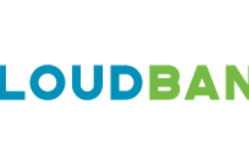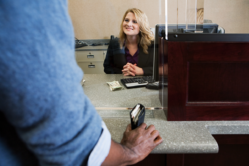I often traveled when I was in the military, and I could never count on finding an ATM from my bank. Even the largest branches can’t have ATM machines everywhere.
The problem with using another bank’s ATM is that you will often get hit with two fees – one from your bank, and one from the bank that owns the ATM. After having multiple fees assessed one too many times, I decided bbI needed to minimize my ATM fees.
How To Avoid ATM Fees
Use Your Debit Card To Get Cash Back
This was my favorite way to avoid ATM fees (my current bank doesn’t charge ATM fees, and I get reimbursed for charges from other banks).
When you make a purchase with your debit card, many stores will allow you to take cash back on the purchase. The cash comes directly from your checking account as though you were withdrawing cash from an ATM or making a purchase.
The store gets the money directly from your account, so they don’t mind.
If I needed cash, I would pull over to the closest Wal-Mart, buy a pack of gum, and get $40 cash back. The gum was cheaper than the ATM fees and I had something to show for the expense.
Keep in mind that most stores limit your cash back to around $20-50, so this will work for small cash needs, but not if you need a lot of money.
Pull Out A Lot Of Money At Once
If I couldn’t get cash back from a debit card purchase or I needed more money than I could get from the debit card purchase, I would use an ATM. But I would make sure I had enough money to last a while. This reduces your ATM fees because you will pull out money less often.
I had a friend who would only pull out $20 when he needed cash (which was several times per week), and he paid 2 ATM fees to do so. An average of about $3 per transaction equaled 15% of his withdrawal!
By pulling out $100 once a week instead of spreading it out over five transactions, he would have saved more than $10 per week. That’s over $500 annually! (He stopped doing this shortly after I told him about getting cash back with an ATM card. He now has a fierce chewing gum habit. 😉 ).
Join A Bank That Doesn’t Assess ATM Fees
Banks that don’t ever charge ATM fees are rare in today’s banking world, but they do exist.
There are even some banks, such as USAA, that not only doesn’t charge ATM fees when you use another bank’s ATM, they also reimburse you the fees the other bank charges you to make the transaction (up to 10 withdrawals per month, and $15 from other banks). You can learn more about opening an account through USAA on their secure site.
I rarely go to an ATM, and I have never come close to the max. I haven’t paid an ATM fee in several years.
Don’t Pay With Cash
I use credit cards for almost every purchase I make. I do this for several reasons, mostly because I use cash back credit cards, it makes tracking expenditures easy with software such as Mint, and for other benefits of using credit cards, like free extended warranties and fraud protection. In addition to using credit cards, you can pay with a check or your debit card instead of using cash.
It’s your money. Sure, $3 or $4 in fees isn’t a lot, but it can add up quickly (as shown above!). It’s your money. You should keep as much as possible.
Ways To Avoid Debit Card Fees
It’s hard to believe, but some banks still charge customers debit card fees when they use their PIN to make a transaction.
Change Banks
In this day and age of free online banking, there is no reason to use a bank that charges fees for using a debit card and various other fees.
A variety of banks offer free online checking accounts, have large networks of ATMs, or don’t charge debit card fees at all. Some of the most popular are:
- Chase Bank – Not only does Chase offer excellent checking and savings accounts, but they also have a huge ATM network.
- USAA – Great for military families and their descendants, USAA has free ATM usage with specific partners, and they will reimburse you up to $15 per month for fees.
Don’t Use Your Debit Card For Purchases If Your Bank Charges Fees
Banks aren’t charging customers just to own a debit card – they are charging them a monthly fee when they use the debit card for purchases by using a PIN.
Many debit cards also function as an ATM card, and you won’t be charged a monthly fee for using your debit card only for ATM withdrawals, though you may still be charged ATM fees if you don’t use an in-network ATM.
This may be an option if you are happy with your bank and don’t mind using your debit card only for ATM withdrawals. As for me, I would rather take my business elsewhere.
Use Credit Cards
If you like the security, convenience, and expense tracking you get with debit cards, consider using a credit card for your spending. Many credit cards have more benefits than debit cards so that you may come out ahead in the long run.
I prefer using cash-back credit cards because I enjoy cash rewards, but other great credit card options can earn you travel rewards, airline miles, or other rewards based on your spending. Just remember to treat your credit card like a debit card (only spend the money if you have it) and you will be fine.
Pay With Cash
Using cash for all expenditures is becoming more popular as people try to avoid the temptations of swiping the plastic. But it can become cumbersome for large purchases or buying things online.
There are ways to get around these inconveniences, such as using a check for large purchases or using a service like PayPal. However, PayPal won’t cover all online purchases, so you may need to get creative.
Write Checks
Checks are another option, but again, there is an inconvenience associated with checks since they are not universally accepted and you can’t always use them online (some retailers are equipped to accept electronic checks, but not all of them are).
Use Prepaid Or Secured Credit Cards
Prepaid and secured credit cards function much like a debit card – you make a deposit, and can only spend how much money you have on hand.
There are a few small differences between the two types of cards – prepaid cards don’t require a credit check, and won’t help with your credit score, and secured credit cards may help your credit and can be a good way to establish or rebuild credit. Some of these cards may have annual fees, so read the fine print before opening a new account.
Mix And Match
I personally use a cash rewards card for as many purchases as I can, and I am sure to pay it in full each month to avoid any fees or interest charges. But you should examine your needs and determine which option best meets your needs, budget, and lifestyle.



Comments:
About the comments on this site:
These responses are not provided or commissioned by the bank advertiser. Responses have not been reviewed, approved or otherwise endorsed by the bank advertiser. It is not the bank advertiser’s responsibility to ensure all posts and/or questions are answered.
Joan says
If you live on the East Coast, WaWa convenience stores have free ATMs for all 🙂
Lauren says
I love the debit card deal, too. Not a gum chewer, but I did need some lightbulbs.
Ryan says
Excellent way to do it, Lauren. 🙂